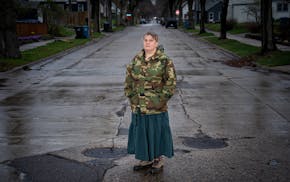The July 4th holiday weekend usually is the busiest of the year on Lake Minnetonka and many other Minnesota lakes and rivers.
Not this year.
After the state's second-wettest June ever, record-high water levels have restricted boating, littered rivers with debris and made creeks too fast and dangerous for paddling. That's affected everything from swimming to canoeing and boating, turning normally raucous lakes full of jet skiers, wake boarders and water tubers into tranquil lakes dotted with a few slow-moving sailboats and fishing boats.
"There's just nobody boating," said Capt. Greg Salo of the state Department of Natural Resources. "Waterways are high, rivers are moving fast, and there've been thunderstorms. It's very little [recreational boating] activity. And the whole tubing and water-skiing thing is nonexistent because of wake restrictions."
Across Minnesota, 55 bodies of water in 18 counties have emergency 30-day no-wake ordinances since the DNR decided in June to give counties, cities and townships more authority to address shoreline erosion and keep boaters safe on high water. In Prior Lake, the city has shut down boat slips on Watzl's and Sand Point beaches, canceled its annual Fourth of July Boat Parade, closed Watzl's Beach to swimming and instituted a no-wake rule across the lake.
As a result, some boaters are just staying home.
Last weekend, when DNR officers launched their annual drunken-boating sting, not a single drunken-boating citation was issued for the first time, and officers only checked 387 boaters — one-third the number last year. DNR officials report that fishing and boating are down on many lakes, including major destination waters such as Vermilion, Mille Lacs and Leech.
And in the metro, Lake Minnetonka — which hit a record-high level in June — has a first-ever lakewide wake rule, crippling business for everything from lakeside restaurants to gas stations, boat repair companies and watercraft rentals that profit off what is normally the Twin Cities' busiest lake.
But the no-wake lake also has anglers, lakeshore owners and pontoon riders rejoicing in a break from the chaos.
"It's like being in the Boundary Waters, except in a powerboat," said Tom Jacob, who owns Bay to Bay Boat Club in Excelsior. "It's so peaceful, it's so quiet, it's so surreal. Everybody's going in slow motion. But it's really cool."
Water's going down, slowly
While some metro area lakes, including Plymouth's Medicine Lake and Chanhassen's Lotus Lake and Lake Susan, have lifted wake restrictions, water levels on other popular lakes like Prior Lake and Lake Minnetonka are still too high. Lake Minnetonka reached a record June 23 at 931.11 feet above sea level. Since then, it's dropped about 3 inches, but it's still about 7 inches too high.
For more than a month, it's been against the law to boat on Minnetonka at a speed that creates more than a minimum wake — which, depending on the boat, can be about 5 miles per hour.
And it's changed the boating scene. On July 3, the normally packed lake was almost empty. A man paddleboarded across the glassy water between Excelsior and Wayzata. Two girls rode a jet ski, crawling across the quiet bay. And loons ducked underwater as fishing guide Kurt Erickson inched his boat along on a typical 10-minute trip that took 45 minutes.
But, he said, "It's a lot easier to fish."
For David Polley of Chaska, the no-wake lake provided a quiet pontoon ride for his family past the normally rowdy party scene of Big Island. Only a small boat, kayak and fishing boat were in view.
"I like this; if I was on a different boat and water skiing, I'd feel different," he said. "This will never happen again in 50 years. It's like having your own private lake."
The lakewide wake restriction is expected to remain in place on Minnetonka at least through July 12, according to the Minnehaha Creek Watershed District, which monitors water levels. The Watershed District also recommends that kayakers and canoers stay off Minnehaha Creek because of dangerously high fast-moving water and debris.
"It's going to be a much more mellow Fourth of July," said watershed spokeswoman Telly Mamayek.
On Lake Minnetonka, if water levels continue to drop, the Lake Minnetonka Conservation District could reduce the wake restriction to boats creating a wake within 600 feet of shore. But the Watershed District doesn't expect water levels to drop enough to lift all restrictions until at least July 19.
The rainy month and now the no-wake rule have made it the worst year in the 19 years of Ken Pittel's jet ski rental business in Mound. This weekend, instead of being fully staffed and booked all weekend, Pittel's dozen Jet Skis at Bay Rentals are sitting idle.
"It's too high to JetSki; I never thought I'd see that," he said, closing up his shop early this week. "This is the weekend that makes my summer — and [this year] I can't rent them. It's been terrible. Every day, I'm turning people away."
He's had to close his shop several times in the past month and although he's tried to rent Jet Skis on other lakes without wake restrictions, it's not enough to keep up business.
An 'amazingly serene' lake
The story is the same on rivers like the St. Croix. But there are bright spots to the high-water and wake rules.
For Tommy Drummond, kayak and paddle board rentals in Excelsior are up because paddlers don't have to fight bigger boats and Jet Skis for space. Anglers and fishing guides are relishing the quiet lake. And statewide, drunken-boating arrests and accidents are down. According to the DNR, four people have died in boating accidents, compared to nine fatalities by this time last year.
And, Jacob said, while the no-wake rule and the pumping of untreated wastewater into the lake last month in Mound made people unnecessarily hesitant to book boats, the quieter lake is perfect for swimmers, families or anyone else who wants a more relaxing, quiet ride on Minnetonka.
"It's so amazingly serene out here," he said. "It's obviously unprecedented. There's a lot of people who have said, 'I wish it would be like this all of the time.'
"I think people don't want to go slow, but it's better than staying home."
Staff writer Doug Smith contributed to this report. Kelly Smith • 612-673-4141 • @kellystrib
One day in the frantic life of a Children's Minnesota emergency room nurse
State Sen. Nicole Mitchell off committee assignments while case under review

GOP endorses Tad Jude for congressional seat Dean Phillips is leaving
